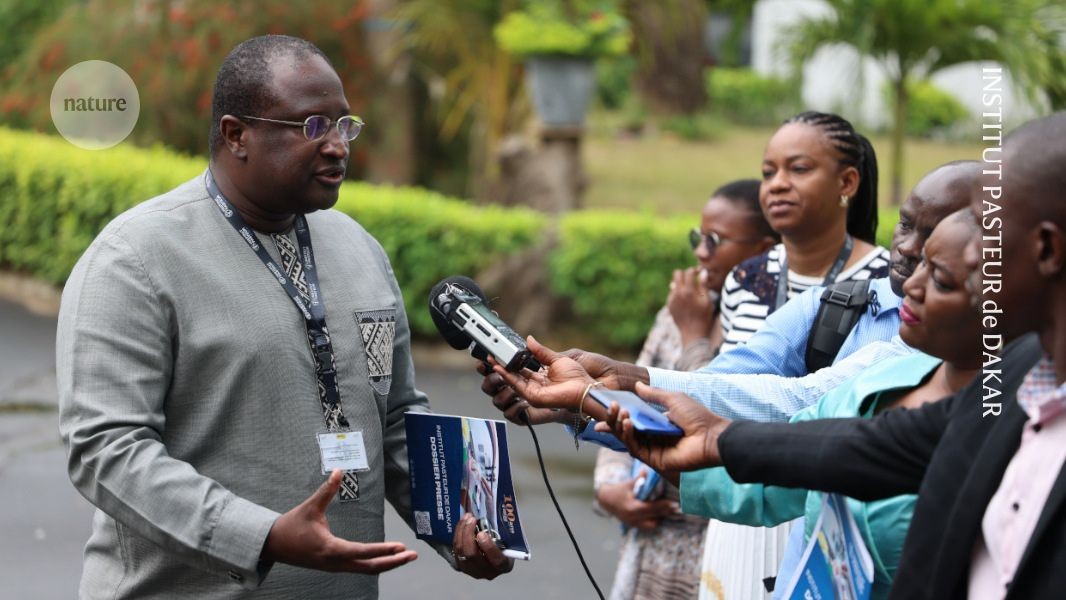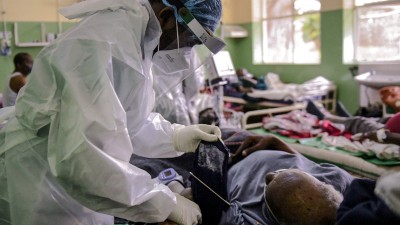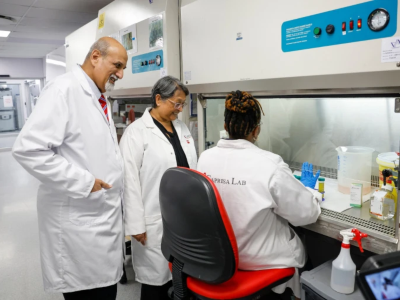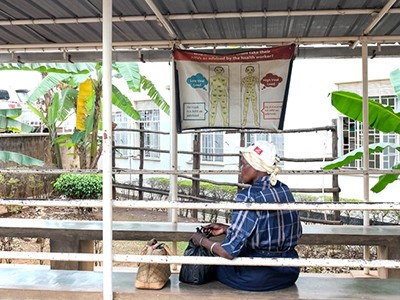More than 300 people gathered at Senegal’s seaside Hôtel Terrou-bi for the centenary celebration of the Pasteur Institute of Dakar (IPD) last December, an event at which the Pasteur Network — which has 32 institutes in 25 countries — toasted the IPD’s achievements. The occasion drew a rich selection of African researchers, philanthropic leaders, policymakers and health ministers, many of whom flocked around virologist Amadou Alpha Sall. The IPD’s former chief executive was the first Black person to have run the institution since it was founded in 1924.
Wearing a long, sparkly Senegalese kaftan, Sall, aged 56, and 2 metres tall, seemed to be everywhere at once in the room.
The radical plan for vaccine equity
In West Africa’s scientific community, Sall is mostly known simply as Amadou. For more than three decades, he has worked as a virologist and public-health expert responding to epidemic outbreaks in dozens of countries, and persuading African government officials and policymakers to support scientific research and the manufacturing of health tools — diagnostics and vaccines — that Africans need in Africa. Solomon Zewdu, a former senior executive of the MasterCard Foundation, a philanthropic organization based in Toronto, Canada, describes Sall as “unusually approachable and fun”.
During his years at the IPD, Sall built international partnerships and amassed support from foreign funders, investors, biotech companies and multilateral organizations. He played a crucial part in decolonizing the IPD, transforming it into a Senegalese non-profit foundation with a mostly Senegalese management staff. Until 2009, it was a private research entity owned by the Pasteur Institute in Paris. “The scientific standing of the institution has continued to improve under Amadou,” says Peter Piot, an Ebola and HIV virologist who chairs the IPD’s scientific advisory board.
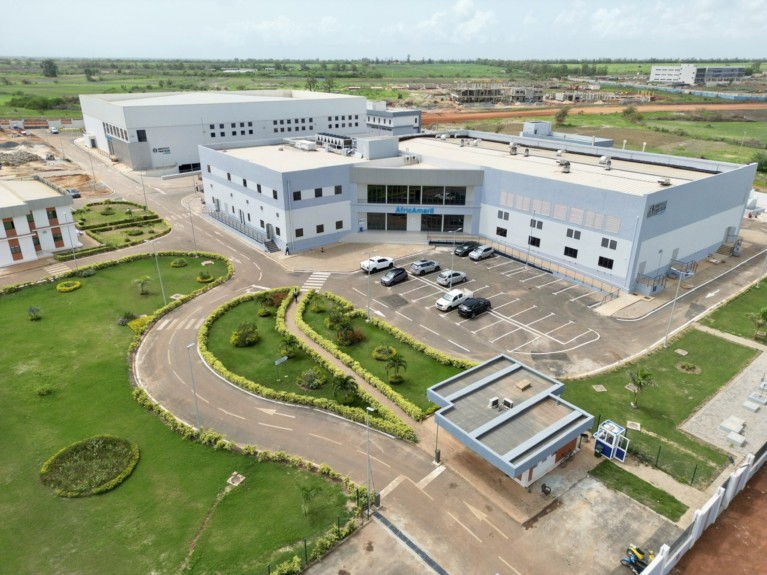
The MADIBA manufacturing complex on the outskirts of Dakar.Credit: INSTITUT PASTEUR de DAKAR
In the last four years of his nine-year tenure as head of the IPD, Sall’s focus was a US$220-million project to build and staff a state-of-the-art vaccine-manufacturing facility in Senegal. The project, Manufacturing in Africa for Disease Immunization and Building Autonomy, known as MADIBA, aims to produce 300 million to one billion doses of high-quality vaccines annually against the most common diseases affecting Africans, including Ebola and measles. (The facility is partly named after Nelson Mandela’s Xhosa clan name, Madiba, as a nod to the former South African president and civil-rights leader’s fight for African independence.) To achieve this, Sall must also build the scientific workforce of his home country. He envisions an end-to-end vaccine-manufacturing hub that will help to ensure vaccine sovereignty for Africa. “We want to own our destiny and not rely on others,” he says.
Trump’s cuts to international aid are stifling Africa’s HIV research
His vision has spurred young, talented Senegalese scientists to return from overseas to run MADIBA, and Sall encourages them by giving them leading roles in the initiative. “My dream is to have Africa become a leader in manufacturing and bring vaccines to the people where they are,” he says. Presidents, health ministers and billionaires, including Bill Gates and Strive Masiyiwa, a Zimbabwean business leader and philanthropist, have backed the project.
Things come together
The MADIBA manufacturing complex lies on the outskirts of Dakar, amid carpets of grass and gleaming, newly paved roads. One of its large buildings, bearing the MADIBA name in bold, blue letters, houses high-performance NevoLine biomanufacturing platforms, consisting of bioreactors used for cell culture, virus manufacturing and the production of viral vaccines.
On a warm, sunny Friday in February, Sall and two site managers, Lamine Sène and Youssouf Balde, toured the five-hectare facility wearing hard hats and orange vests. Balde, a Senegalese bioengineer recruited by Sall from Canada, explains that the plant can handle various levels of production, from small bioreactors to large-scale manufacturing. And its multi-suite drug platforms, designed by the Stockholm-based company KeyPlants, mean that MADIBA has the ability to carry out pharmaceutical and biomanufacturing processes to produce drugs that go beyond viral-vaccine manufacturing. “The design includes modules for different technologies, allowing for flexibility and adaptability in case of disruptions,” such as a key supply becoming too costly, Balde says.
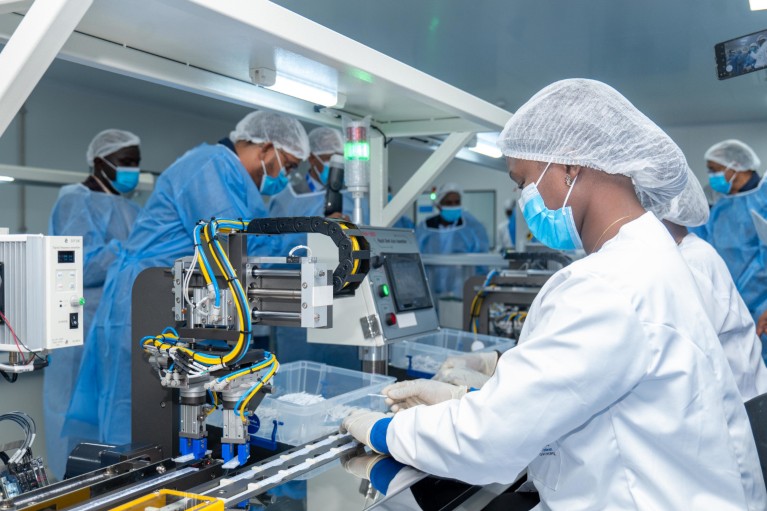
Scientists at work in a laboratory run by the Pasteur Institute of Dakar, where Amadou Sall launched his MADIBA project to support biomanufacturing in Africa.Credit: INSTITUT PASTEUR de DAKAR
Sall adds that, once operational, the facility will produce both liquid and freeze-dried vaccines against a range of epidemic-prone diseases, including measles, rubella, Rift Valley fever, Lassa fever and Ebola. AfricAmaril, a second plant, next to MADIBA, will use egg-based cell-culture techniques to boost the production of yellow-fever vaccine from 5 million to 30 million doses per year, to meet the needs of the continent.
MADIBA’s arrival couldn’t be timelier. More people die from infectious diseases in Africa than anywhere else in the world, but the continent has lagged behind in developing the tools needed to address its health challenges. More than 90% of drugs and 99% of vaccines used by Africans are imported — a stark reality that was revealed during the COVID-19 pandemic. “I find it so unfair that Africans are dying of some disease where there’s a solution,” Sall says.
The COVID-19 pandemic exposed inequities in global vaccine distribution and highlighted the dangers of African countries relying on wealthier nations. As a result, African leaders and the African Union’s 55 member states pledged to increase the share of vaccines produced on the continent from 1% to 60% by 2040. For Balde, the pandemic was a painful reckoning. But it was also an opportunity: “Why couldn’t we have those hands [making vaccines] work within Africa?”
The end of AIDS is in sight: don’t abandon PEPFAR now
As the pandemic raged in 2021, Balde, who was working at ProMetic BioSciences in Laval, Canada, organized a virtual conference for Senegalese-diaspora scientists to discuss ways in which they could contribute to fighting the pandemic from abroad. There, he first met Sall, who presented the MADIBA concept and convinced Balde that progress can happen when Africa’s brightest minds abroad gain knowledge and then return home to build up capacity. “He didn’t claim to have all the answers, but I saw that he’s creating the space for talented individuals to contribute, to build something bigger than themselves,” says Balde. By May 2024, Balde was on the job in Senegal.
The MADIBA project kicked off in early July 2021. Such a big initiative needed hundreds of millions of dollars in international bank investments and private donations, and a land grant from Senegal’s government. Sall has won over more than a dozen major investing partners and donors, including the European Investment Bank, the European Union and the International Finance Corporation, by convincing them of the economic impacts of saving lives and building human capital.
For example, the Mastercard Foundation is bankrolling a US$45-million advanced vaccine-bioprocessing laboratory at the IPD’s campus in central Dakar; the lab also serves to train young Africans in vaccine manufacturing. The IPD’s vaccine-research centre currently has more than 50 scientists working on vaccine development, of whom about 60% have returned from overseas. Marie-Angélique Sène, the head of the centre, was recruited by Sall while completing her PhD at McGill University in Montreal, Canada. “It was a no-brainer for me. What you’ll get from the mission, you won’t get anywhere else.”
However, getting MADIBA off the ground hasn’t been easy. As the facility tour comes to an end, Sall looks tired. “He is always working all the time,” Balde says. The job is hard, and Sall admits he has paid for it in lost sleep.
Bringing it home
Over a lunch of yassa — a spicy Senegalese dish of braised chicken and rice, with copious onions — at a restaurant near the IPD, Sall recounts how his childhood in Dakar shaped his leadership skills.


